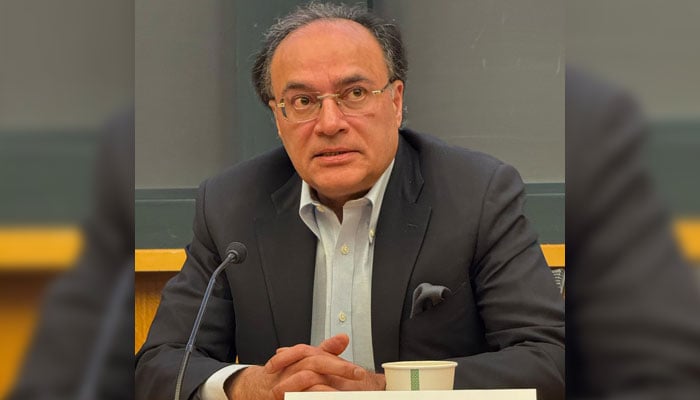Harvard conference: Finance czar flags key growth opportunities in various sectors
Muhammad Aurangzeb lays out plan to expand digital banking, capital markets, and green finance
ISLAMABAD: Speaking at Harvard University in US on Monday, Finance Minister Muhammad Aurangzeb underscored Pakistan's economic turnaround and invited investors to invest in key sectors in the country.
"After inheriting an economy facing significant challenges — from contracting GDP to depleting reserves — we have stabilised the fundamentals, restored confidence, and reignited growth, " Aurangzeb said at "Bridging Divides, Building Tomorrow: Pakistan's Path to Inclusive Growth and Governance" conference at the varsity.
The annual flagship event of the Pakistan Conference serves as a vital forum to advance collaborative solutions, promote global engagement and brings together policymakers, academics, business leaders, and students to discuss Pakistan’s economic, political, and social trajectory.
Expressing his views, the finance czar highlighted key achievements including a historic reduction in inflation to 0.7%, the lowest in 60 years; foreign exchange reserves doubled, a 3% currency appreciation, and a current account surplus exceeding $1 billion in March 2025.
Pakistan also witnessed a 44% increase in Foreign Direct Investment (FDI), a 24% rise in IT exports, and record-high remittances projected at $38 billion.
For the first time in 24 years, Pakistan achieved a fiscal surplus, with the highest primary fiscal surplus in two decades. Fitch has upgraded Pakistan's credit sovereign credit rating to B- with a stable outlook.
Emphasising that "stability is not an end but a means to an end," the FinMin outlined the government’s strategy including maintaining fiscal discipline, controlling inflation, and pushing ahead with deep structural reforms in energy, taxation, governance, and the management of state-owned enterprises.
He flagged major growth opportunities in Pakistan’s rich mineral resources, expanding IT sector, green energy initiatives, and the country’s youthful entrepreneurial population. Strengthening human development, he emphasised, is critical to sustaining high, inclusive growth.
On debt management, the Minister noted that Pakistan successfully reduced its public debt-to-GDP ratio from 75% to 67.2%, with a plan to bring it below 60% over the medium term through prudent fiscal management, enhanced domestic financing, and tax reforms.
Rightsizing government expenditures and privatising loss-making state-owned enterprises are expected to save up to 2% of GDP annually, with efforts focusing on transparency, competitive processes, and investor confidence.
Discussing Pakistan's financial sector, the Minister laid out plans to build a deeper and more resilient system by expanding digital banking, capital markets, and green finance.
Highlighting the impact of climate change, the Minister reaffirmed Pakistan’s commitment to integrating resilience into infrastructure and agriculture. He singled out the Resilience and Sustainability Facility (RSF) from the International Monetary Fund (IMF) and Country Partnership Programme (CPF) approved by the World Bank as an anchor for building climate resilience.
"Pakistan's future will be shaped by bold, necessary choices. By investing in our people, modernising our economy, and staying committed to reform, Pakistan will emerge stronger, greener, and more competitive," concluded the finance minister.
-
Global memory chip crunch puts spotlight on Apple; Will iPhone become more pricey?
-
Bitcoin plummets toward $60,000 as investors dump risky bets
-
Bitcoin crashes below $63K as regulatory pressure and market fears grow
-
Bitwise Crypto Industry innovators ETF: What investors should do in 2026?
-
Nintendo shares slide again as momentum fears grow
-
Gold, silver prices fallen sharply; What’s driving the drop?
-
Gold’s record climb: Experts question if its safety is ‘overstated’
-
Dubai unveils plans to construct street built with real gold













